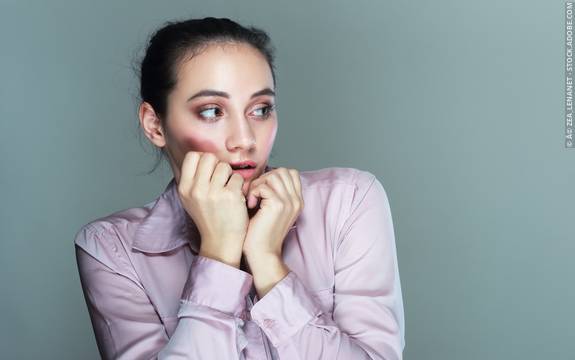Sufferer's account:
|
"In any social situation, I felt fear. I would be anxious before I even left the house, and it would escalate as I got closer to a college class, a party, or whatever. I would feel sick at my stomach—it almost felt like I had the flu. My heart would pound, my palms would get sweaty, and I would get this feeling of being removed from myself and from everybody else. "When I would walk into a room full of people, I'd turn red and it would feel like everybody's eyes were on me. I was embarrassed to stand off in a corner by myself, but I couldn't think of anything to say to anybody. It was humiliating. I felt so clumsy, I couldn't wait to get out. "I couldn't go on dates, and for a while I couldn't even go to class. My sophomore year of college I had to come home for a semester. I felt like such a failure."
|
Social phobia, also called social anxiety disorder, involves overwhelming anxiety and excessive self-consciousness in everyday social situations. People with social phobia have a persistent, intense, and chronic fear of being watched and judged by others and being embarrassed or humiliated by their own actions. Their fear may be so severe that it interferes with work or school, and other ordinary activities. While many people with social phobia recognize that their fear of being around people may be excessive or unreasonable, they are unable to overcome it. They often worry for days or weeks in advance of a dreaded situation.
Phobias
Social phobia can be limited to only one type of situation—such as a fear of speaking in formal or informal situations, or eating, drinking, or writing in front of others—or, in its most severe form, may be so broad that a person experiences symptoms almost anytime they are around other people. Social phobia can be very debilitating—it may even keep people from going to work or school on some days. Many people with this illness have a hard time making and keeping friends.
Physical symptoms often accompany the intense anxiety of social phobia and include blushing, profuse sweating, trembling, nausea, and difficulty talking. If you suffer from social phobia, you may be painfully embarrassed by these symptoms and feel as though all eyes are focused on you. You may be afraid of being with people other than your family.
People with social phobia are aware that their feelings are irrational. Even if they manage to confront what they fear, they usually feel very anxious beforehand and are intensely uncomfortable throughout. Afterward, the unpleasant feelings may linger, as they worry about how they may have been judged or what others may have thought or observed about them.
Social phobia affects about 5.3 million adult Americans.1 Women and men are equally likely to develop social phobia.10 The disorder usually begins in childhood or early adolescence,2 and there is some evidence that genetic factors are involved.11 Social phobia often co-occurs with other anxiety disorders or depression.2,4 Substance abuse or dependence may develop in individuals who attempt to "self-medicate" their social phobia by drinking or using drugs.4,5 Social phobia can be treated successfully with carefully targeted psychotherapy or medications.
Social phobia can severely disrupt normal life, interfering with school, work, or social relationships. The dread of a feared event can begin weeks in advance and be quite debilitating.
Adapted from: http://www.nimh.nih.gov/publicat/anxiety.cfm



























